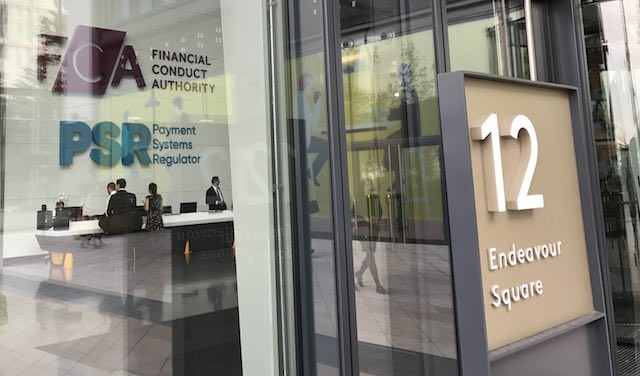The Financial Conduct Authority has apologised for its handing of the collapse of London Capital & Finance (LCF) and the Connaught Income Fund Series 1 and has set out its approach to assessing related complaints.
The regulator said that LCF investors who were given incorrect information by the FCA will be offered ex-gratia payments, if they have not already been compensated by the FSCS.
As part of the process of assessing complaints made to the FCA in relation to LCF, the regulator conducted an initial review of investors’ direct communications with the FCA over the period between 1 April 2014 and 10 December 2018, the date of the FCA’s first regulatory intervention.
As a result, the regulator has identified investors who were given incorrect information in these direct communications with the FCA which may have led them to conclude their investment would be safer than it was.
The regulator said: “While we do not believe this was the primary cause of these investors’ losses, those direct communications may have been a factor in their decision to invest, or to remain invested. While each case will be given individual consideration, given the exceptional circumstances the FCA intends to offer ex-gratia payments to the small number of investors who fall into this category who have not already been compensated by the FSCS.”
The regulator will be contacting the identified investors directly to discuss these “ex-gratia” payments irrespective of whether they have already made a complaint.
The regulator said that whilst it does not expect to make payments to other investors, complaints will be considered individually. It expects to be able to provide a response to complaints by the end of June.
The FCA was roundly criticised for its handling of the LCF fiasco by the Dame Gloster Report into the collapse.
The FCA said that is acknowledges the findings in the report and that LCF’s collapse has had a significant impact on the lives of many individuals who invested money they could not afford to lose. In a statement the regulator said: “We are very sorry for the errors we made in our handling of this case. We accepted, and have committed to implementing, each of the recommendations which Dame Elizabeth Gloster made for the FCA in her review.”
Together with the Serious Fraud Office (SFO), the FCA is continuing to investigate the circumstances surrounding the sale of mini-bonds issued by LCF.
The regulator also apologised for its handing of the FCA’s handling of the Connaught Income Fund Series 1 and connected companies.
The regulator said that following the independent review into its handing of Connaught, it has reconsidered the issue of remedies to the majority of complaints that were investigated in 2017 and has determined that “an apology is the most appropriate remedy in the circumstances.”
The regulator will be contacting Connaught complainants directly to provide its apology but did not mention any compensation payments.
Treasury minister John Glen yesterday announced a £120m government-backed compensation scheme for LCF mini-bond victims which will pay up to 80% of losses up to a maximum of £68,000.
He said the government would establish a scheme that would be available to all LCF bondholders, including those who have not already received compensation from the Financial Services Compensation Scheme.
PIMFA, the trade association for wealth management, investment services and the financial advice industry welcomed the government-funded scheme saying that is "right that the government is stepping in."
Tim Fassam, director of government relations and policy at PIMFA, said: "While we welcome this move, we have always been clear that any consumer who is in need of compensation has, by definition, received a poor outcome that it would have been better to avoid in the first place.
“To this end, we welcome moves by the Government to consult on bringing the issuance of mini-bonds within the regulatory perimeter; a move which, in combination with the promotion of unregulated investments becoming a regulated activity, will reduce consumer harm in future.”
Some 11,625 investors lost savings worth a total of £237m when LCF collapsed with the majority so far not compensated by the FSCS due to questions about whether their investments were regulated or not.
Mr Glen, economic secretary, said the government-funded scheme was being set up due to “the unique and exceptional nature of the situation concerning London Capital & Finance (LCF).”
The government scheme will provide 80% of LCF bondholders’ initial investment up to a maximum of £68,000. Where bondholders have received interest payments from LCF or distributions from the administrators, Smith & Williamson, these will be deducted from the amount of compensation payable.
The scheme will be available to all LCF bondholders who have not already received compensation from the Financial Services Compensation Scheme (FSCS) and represents 80% of the compensation they could have received had they been eligible for FSCS protection, which is capped at £85,000.
The FSCS has so far paid out £57m to around 2,800 LCF bondholders, about a quarter of those who lost money. It has been considering the remaining cases.
Around 97% of all LCF bondholders invested less than £85,000 and therefore will not reach the compensation cap under either the government scheme or the FSCS, Mr Glen said.
Mr Glen said the government expects to pay out around £120 million compensation to around 8,800 people in total and to have paid all bondholders within 6 months of securing the necessary primary legislation, which it will bring forward as soon as parliamentary time allows.
In its latest statement the regulator added: “We are making good progress in implementing the recommendations in Dame Elizabeth Gloster’s review and continue to reform the way the FCA operates through our transformation programme, to better protect consumers in future.”

